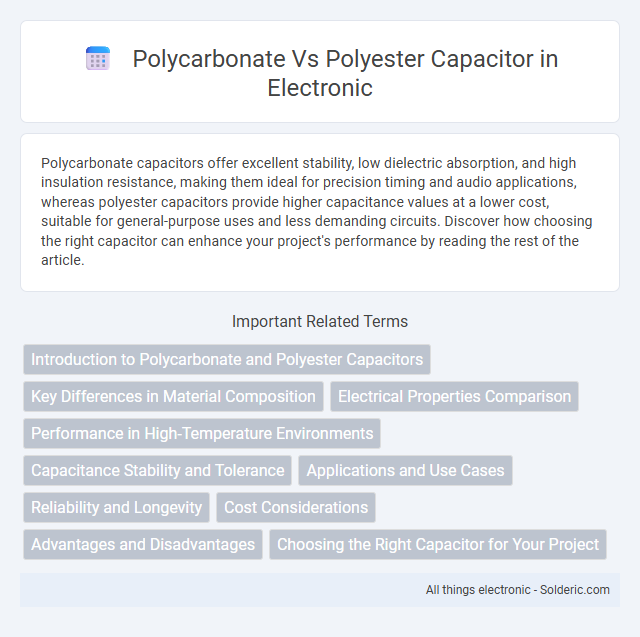Polycarbonate capacitors offer excellent stability, low dielectric absorption, and high insulation resistance, making them ideal for precision timing and audio applications, whereas polyester capacitors provide higher capacitance values at a lower cost, suitable for general-purpose uses and less demanding circuits. Discover how choosing the right capacitor can enhance your project's performance by reading the rest of the article.
Comparison Table
| Feature | Polycarbonate Capacitor | Polyester Capacitor |
|---|---|---|
| Dielectric Material | Polycarbonate Film | Polyester Film (PET) |
| Temperature Range | -55degC to 125degC | -55degC to 105degC |
| Dielectric Constant | 3.2 - 3.4 | 3.1 - 3.2 |
| Dielectric Strength | 150 - 180 MV/m | 110 - 130 MV/m |
| Tolerance | +-5% to +-20% | +-5% to +-20% |
| Stability | High stability and low loss | Moderate stability and higher loss |
| Moisture Absorption | Low | Higher |
| Typical Applications | Precision electronics, timing circuits | General purpose, filters, coupling |
| Cost | Higher | Lower |
Introduction to Polycarbonate and Polyester Capacitors
Polycarbonate capacitors offer excellent electrical stability, low dielectric absorption, and high insulation resistance, making them ideal for precision timing and audio applications. Polyester capacitors, known for their cost-effectiveness and good general-purpose performance, provide reliable capacitance with moderate tolerance suitable for filtering and coupling tasks. Your choice between polycarbonate and polyester capacitors should consider the specific application requirements, such as temperature range, frequency response, and stability over time.
Key Differences in Material Composition
Polycarbonate capacitors use a thermoplastic polymer known for high dielectric strength and excellent stability under heat, while polyester capacitors consist of polyethylene terephthalate (PET), offering good dielectric properties but lower thermal resistance. The molecular structure of polycarbonate provides superior moisture resistance and lower dissipation factor, enhancing capacitor performance in precision applications. Your choice between these materials depends on the required thermal stability and dielectric reliability for the specific electronic circuit.
Electrical Properties Comparison
Polycarbonate capacitors exhibit superior electrical properties such as low dielectric absorption, high insulation resistance, and stable capacitance over a wide frequency range compared to polyester capacitors. Polyester capacitors typically have higher dielectric losses and lower voltage ratings, which can impact performance in high-frequency or precision applications. Your choice between polycarbonate and polyester capacitors should consider these electrical characteristics to ensure optimal circuit stability and efficiency.
Performance in High-Temperature Environments
Polycarbonate capacitors maintain stable capacitance and low dielectric loss even at temperatures up to 125degC, making them reliable in high-temperature environments. Polyester capacitors, however, exhibit increased leakage current and reduced insulation resistance above 85degC, potentially affecting long-term performance. Choosing polycarbonate ensures your circuitry performs consistently under elevated thermal conditions.
Capacitance Stability and Tolerance
Polycarbonate capacitors exhibit superior capacitance stability with minimal variation over temperature and time, maintaining tolerance levels typically within +-5%. Polyester capacitors, while cost-effective, tend to have wider tolerance ranges, commonly +-10% to +-20%, and experience greater capacitance drift due to temperature fluctuations. The enhanced stability of polycarbonate capacitors makes them preferable for precision applications requiring consistent capacitance performance.
Applications and Use Cases
Polycarbonate capacitors excel in applications requiring high stability and low dielectric absorption, such as precision timing circuits, audio equipment, and pulse circuits. Polyester capacitors are widely used in general-purpose applications like filtering, coupling, and decoupling in consumer electronics due to their cost-effectiveness and reliable performance. Your choice depends on the need for temperature stability and frequency response, with polycarbonate favored for demanding or high-frequency uses.
Reliability and Longevity
Polycarbonate capacitors exhibit high reliability and longevity due to their excellent thermal stability and low dielectric absorption, making them ideal for precision applications requiring consistent performance over time. Polyester capacitors, while cost-effective and widely used, tend to have higher dielectric losses and degrade faster under prolonged heat exposure, resulting in reduced lifespan and reliability. For your projects demanding durability and stable capacitance, polycarbonate capacitors offer superior long-term reliability compared to polyester alternatives.
Cost Considerations
Polyester capacitors generally offer a lower cost compared to polycarbonate capacitors, making them a budget-friendly choice for many applications. Polycarbonate capacitors, while more expensive, provide superior stability and temperature tolerance, potentially reducing replacement and maintenance costs in the long term. You should weigh the upfront expense against performance requirements to determine the most cost-effective option for your project.
Advantages and Disadvantages
Polycarbonate capacitors offer excellent stability, low dielectric absorption, and a high operating temperature range up to 125degC, making them suitable for precision timing circuits. Polyester capacitors provide cost-effective performance with high capacitance values and good frequency response but suffer from higher dielectric absorption and lower temperature tolerance, typically up to 85degC. Your choice depends on the application: polycarbonate capacitors excel in critical, high-precision uses, while polyester capacitors are better for general-purpose, budget-sensitive designs.
Choosing the Right Capacitor for Your Project
Polycarbonate capacitors offer excellent stability, low dielectric absorption, and high-frequency performance, making them ideal for precision circuits and audio applications. Polyester capacitors provide cost-effective solutions with good capacitance values and higher volumetric efficiency, suitable for general-purpose use and less demanding environments. Selecting the right capacitor depends on project requirements such as temperature tolerance, frequency response, and budget constraints.
Polycarbonate vs polyester capacitor Infographic

 solderic.com
solderic.com